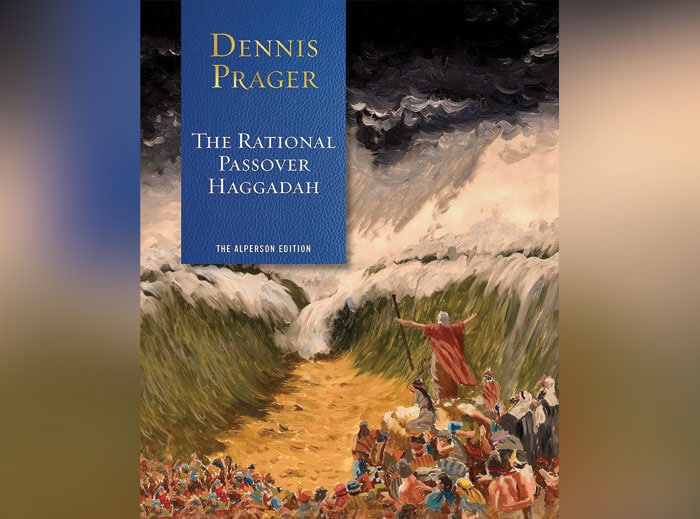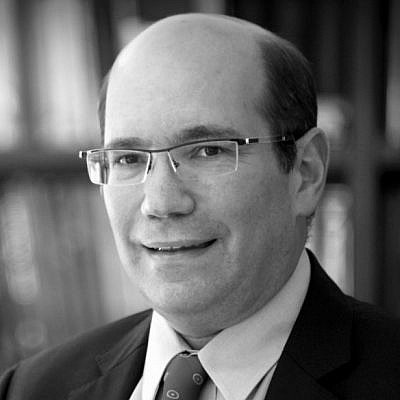
Gil Troy: I am fascinated by your decision (with your Bible too), to use the word rational … on one level, I get it, the message is that this tradition is reasonable and relevant — and in a world that is too dismissive of our ancient yet still timely teachings, I get it. But in both your introduction to “The Rational Bible” and throughout the “Rational Haggadah,” you keep coming back to the b-word, belief … So, doesn’t using the word “rational” undermine your important messaging about belief, about taking a leap of faith along with a more thoughtful deep dive into the logic and reason shaping both the Bible and the Haggadah?
Dennis Prager: “Belief” is not synonymous with “irrational.” Beliefs can be rational or irrational. If you believe your car speaks to you, that is irrational. If you believe your spouse cheated on you because various behaviors on his or her part led you to that belief, that belief may be quite rational.
My beliefs are rooted in reason. For example, I do not know God exists, but reason alone leads me to believe He does. God’s existence is not provable, but not provable is not the same as not rational. My attitude is best expressed by the title of a book written by the late British Jewish theologian, Rabbi Louis Jacobs: “We Have Reason to Believe.” The title means two things: there are reasons to believe and God gave us reason in order to use it to come to belief.
GT: You write in explaining Magid: that “Nations that do not tell their story to each succeeding generation will eventually have no succeeding generation to whom to tell their story.” I couldn’t agree more . . . and, I would add two words which I know you meant “Nations that do not tell their story with pride.” I know you work very hard on this issue, fighting the self-hatred that is corroding both American pride and Jewish pride, and most particularly American Jewish pride. I just want to give you an opportunity to jump off of your excellent work on this issue to drive that message home.
DP: Those two words are worthy of adding — especially when one can honestly tell the story of one’s people with pride. Of course, one should tell the whole story, not just the good parts. For both Jews and Americans, thankfully, one can tell the whole truth with pride, despite the flaws — such as slavery and racism in American history, and, in Jewish history, the disproportionate role Jews played in promoting communism, the greatest mass murder ideology of the modern world.
GT: As I was reading “The Rational Haggadah,” I was reading it through three lenses: One, the lens of today . . . second, the lens of other Dennis Prager books I have read over the decades . . . and third, the lens of every other Haggadah I (and you) have read. How has your reading of the Haggadah changed over the years? What do you think you added this time that you wouldn’t have thought of – or felt compelled to spell out – ten years ago, thirty years ago, one hundred years ago?
“One reason I wrote this Haggadah was to stimulate new and deeper discussions. I wouldn’t have thought to do that thirty years ago.”
DP: By midlife, I realized that I and the others at the Seder table were saying pretty much the same things we said in previous years — despite the fact that I have shared Seders with particularly knowledgeable and deep Jews. So one reason I wrote this Haggadah was to stimulate new and deeper discussions. I wouldn’t have thought to do that thirty years ago. Also, I have accumulated insights over a lifetime of Seders that I didn’t have earlier. For example, why is there no “good” son among the four sons? There is a “bad” son, but there is no “good” son. The answer I offer is meant to be life changing.
GT. Mah Nishtanah? Why is this Haggadah different from all other Haggadot?
“It is filled with important discussions — such as, ‘If God took the Jews out of Egypt, why didn’t He take the Jews out of Europe?’ And Why is there no ‘good’ son among the four sons?”
DP: For many reasons. First, it explains almost everything in terms accessible to any participant. Second, it makes just about everything relevant. Third, it is filled with important discussions — such as, “If God took the Jews out of Egypt, why didn’t He take the Jews out of Europe?”
GT: What is your favorite addition or twist that you provided? What do you most want readers of this new Haggadah to appreciate?
DP: The two I have cited — why there is no “good” son and why God didn’t God take the Jews out of Europe — are two of my favorites. In addition, I think that my listing of the Principles of the Jewish Faith — seventeen of them — is, alone, worth the price of the book. It will force every person at the table to consider what he or she actually believes about God, Judaism, religion in general, and the afterlife, among other major matters.
GT: What is your favorite part of the Seder/Haggadah in general?
DP: As a child, it was being with relatives, some of whom I only saw once a year and “stealing” the afikoman. For returning the afikoman, my grandfather gave me the two most important material gifts of my youth — a shortwave radio to hear broadcasts from all over the world and a portable typewriter.
As an adult, I have come to appreciate the discussions my friends and I have engaged in — from theological insights to recalling childhood memories. And I love the songs that end the Seder.
GT: Over your lifetime, what has been the most important lesson you have wanted people to learn about Pesach and the Seder?
“Ritual and memory are the keys to national and religious survival.”
DP: That ritual and memory are the keys to national and religious survival and that God is central to Judaism (hence, Moses’s name appears only once in the entire Haggadah). Or, to put simply, no God, no Judaism.
GT: What can we learn that will be most useful as a tikkun in society in general, or in our own lives.
DP: Goodness cannot be achieved without wisdom. In fact, good intentions without wisdom frequently lead to evil. So, you can’t “repair the world” (tikkun olam) without wisdom. ■
Professor Gil Troy is the author of nine books on Presidential History including “Why Moderates Make the Best Presidents: From George Washington to Barack Obama.” His latest book, written with Natan Sharansky is “Never Alone: Prison, Politics, and My People.” Follow him on Twitter @GilTroy























 More news and opinions than at a Shabbat dinner, right in your inbox.
More news and opinions than at a Shabbat dinner, right in your inbox.